Owning the Cardinal Directions of the Heart: An Interview with Author Nick Harkaway
O frabjous day! (Callooh! Callay!) It is March 20th, 2012– the official US release date of UK-based author Nick Harkaway‘s second novel, Angelmaker.
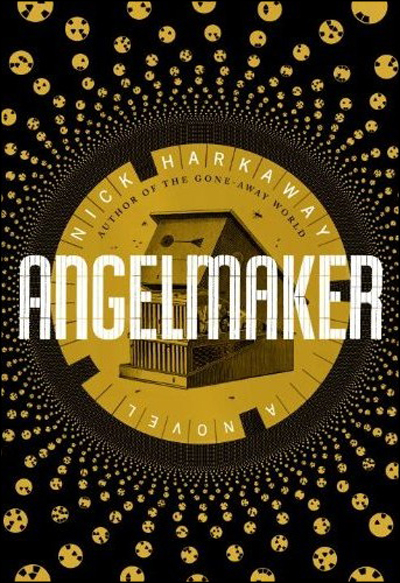
Comrades, if you appreciate joyful and highly original storytelling, you need to pick up this book. Immediately. Trust me when I tell you that Angelmaker is easily one of the most endearing works of fiction that will be published this year… or next, for that matter.
Better yet, trust William Gibson: “You are in for a treat, sort of like Dickens meets Mervyn Peake in a modern Mother London. The very best sort of odd.” Or Tim Martin: “this is as far as it could be from the wearied tropes that dominate so much of fantasy and SF.” Or Glen Weldon: “A big, gleefully absurd, huggable bear of a novel.” Or Charles Yu: “Nick Harkaway’s novel is like a fractal: when examined at any scale, it reveals itself to be complex, fine-structured and ornately beautiful. And just like a fractal, all of this complexity and beauty derives from a powerful and elegant underlying idea.”
(Yes. YES! THIS. What they said. All of it, plus tax, and with great interest.)
Who among you has read Harkaway’s debut novel, The Gone-Away World? Those who have know what a big-hearted and ferociously intelligent storyteller he is– how he crafts narratives that defy categorization (and sometimes gravity), shunting his intricate, multi-pronged prose along at breakneck speeds. TGAW is a sprawling, surprisingly poignant hero’s epic that unfurls like a Lichtenberg figure against an unlikely backdrop of pirates, mimes, ninjas, horrific super-weapons and devastating post-apocalypse. It’s equal parts meticulous, silly, sincere, impassioned, hilarious.
The yarn of Angelmaker is made of similarly electric stuff, only spun even more finely, and woven so intricately that many passages play out like a kind of multi-layered literary sleight-of-hand: How did he do that? Within his wordplay, Harkaway ensconces acts of commensurately deft swordplay, espionage, gangbuster hijinks, and even higher fantasy. Intricate family bonds are explored and philosophical quagmires grappled with. There are trains, planes, automobiles, and submersibles. Sex! Monks! Murder! Mechanical bees! We are introduced to tragic elephants and a heroic pug. Harkaway dares us not to fall in hopelessly in love with each and every character and object and exotic locale he braids into the microcirculatory tapestry. (Bear in mind, there are thousands of distinct and lavishly described elements.)
At the golden hammering heart of the story we find Joe Spork, a lonely/adorable identity-crisis-having horologist, and Edie Banister, a ninety-year-old former superspy whose badassery transcends time and easy pigeonholing. Together –with the help of their magnificent friends/lovers/family, and thwarted by an assortment of deliciously loathsome villains– Joe and Edie must rescue the world from an antiquated doomsday device unlike anything anyone ever imagined… save for the tormented genius Frenchwoman who haplessly invented it.
It all sounds utterly absurd, doesn’t it? Well, it is. Ravishingly so.
Now. That being said, I’m delighted to present the following Coilhouse interview with Nick Harkaway, author of Angelmaker and The Gone-Away World. Huge thanks to Qais Fulton for supplying several of these questions, and downright humongous thanks to Mister Harkaway for taking the time to answer them all so thoughtfully.
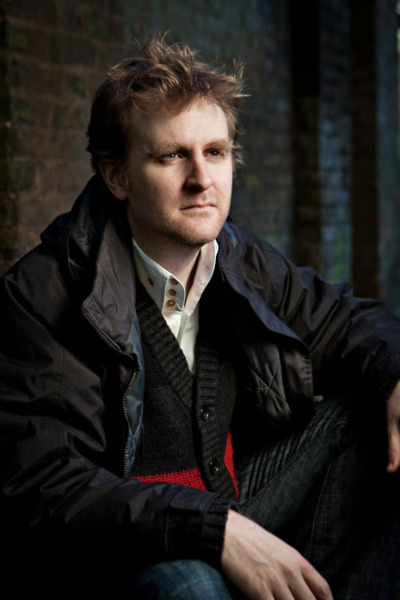
Nick Harkaway. Photo by Rory Lindsay.
COILHOUSE: You were a professional screenwriter before becoming a novelist. Both The Gone Away World and Angelmaker –while infinitely more complex, dense, and multi-layered than the medium of film could ever allow for– have decidedly cinematic qualities: panoramic descriptions of places and scenes, well-paced bursts of action, crackling dialogue. Do you often find yourself pushing or pulling against that previous construct, or have you compartmentalized the two mediums? What (if any) are some of the most important tools you’ve brought with you from your screenwriting career?
NICK HARKAWAY: Mostly for me the sense of the story leads the writing, so I know where I’m going and I come up with how to say it as I go. (I don’t mean that character doesn’t drive, rather than I have an overarching sense of what character and plot will do in combination, and I then have to write a line through that using the right scenes and the right language to express it. There’s a constant battle to find words and events which properly capture the concept in my head. And sometimes it turns out that the concept has conveniently ignored some logical realities and I have to bridge a gap…)
But screenwriting is a terrific base to work from. There are two gifts it gives which are obvious: if you’ve written a movie script, you know that you can finish a story. (I swear, more people get hung up on sheer terror of the long form than anything else.) And you know about concision. Every good writer I know has at one time or another worked in a field which required them to be able to express a lot in a short space, with minimal linguistic flourish. Whether that’s journalism, the civil service, the law, or something else, it’s a great discipline. I, obviously, have sort of abandoned that kind of sparse writing, at least for the moment, but that doesn’t mean I don’t benefit from it.
What pushed you to write your first novel? Was there a specific catalyst?
Yes. I was heartily sick of pitch meetings. I couldn’t stand taking another great story to someone who was fried on Starbucks’ coffee and not really paying attention and have them object to everything which was interesting about it and then complain that what was left wasn’t original enough. Or some variation on that theme. The final straw was a musketeer-ish story I wanted to write which was about a women who had, in her youth, dressed as a kind of D’Artagnan figure. She’s in middle age, her kid gets kidnapped, and she has to go back to being an adventurer – but she’s no longer a waif. She’s a farmer. She’s strong, heavy, and very obviously female. So she puts on a fake beard and decides essentially to be Porthos instead. There was all kinds of fun stuff in that story – just talking about it I want to get it out of the drawer again. Anyway, my panel of (female) execs sit through this, and at the end they say “well, it’s kinda hard to place stories with a middle-aged female lead”. And that is their entire critique apart from a nice extra kiss-off about transvestitism being hard to sell, too. And I just thought “screw this”.
The tale of The Gone Away World story is (rambunctiously!) imparted by a first-person narrator, while Angelmaker is conveyed in (a warm and empathic tense-changing) third-person. What were some of the more rigorous and/or fun challenges for each voice?
The challenge is always to tell the story, and you’re always going to have problems one way or another. In TGAW I had to find ways to detail events which the narrator does not directly experience. In Angelmaker I had to make you care about Joe without being able to go inside his head in the same way. And obviously, I actually spend some time in Edie’s life, too. Multiple viewpoints are fun, but they can dilute the sense of connection, and that’s fatal. So it’s tempting to take a new POV for everyone you need to talk about, but you can’t, you have to sneak around and do reports, lettters, convesrations… otherwise it’s just a confusing patchwork. Unless you make that variety a thing, I suppose. Hmm…
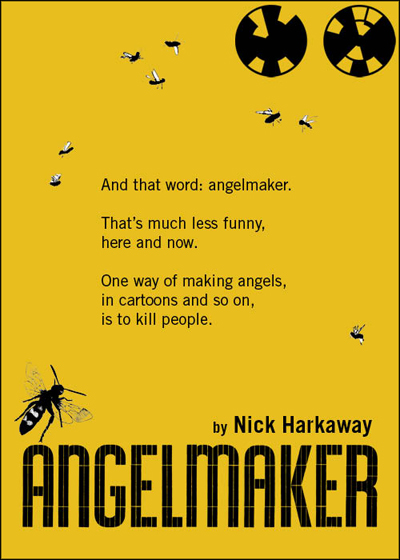
Angelmaker is action-packed bordering on manic– as rollicking as a yarn can get. And yet, on levels far surpassing the average action/adventure story, indeed right down to its core, Angelmaker is held together by this calm, unwavering compassion. Readers get an opportunity to experience humanity at its most inspired, its ugliest, its most frightening and wondrous and clever and provocative and lovable, and have a good laugh in the process. (Whew! That was a rather long-winder preface to this question:) How, and from where, have you cultivated your seemingly bone-deep optimism and empathy? How do these boons inform your day-to-day life?
I’ve always been almost too willing to feel for the other guy. I’m not a great competitive sportsman because I don’t like to upset my opponent. I enjoy the game, the skill, the reciprocity, but I hate it when it comes to an end and someone has to lose. On the other hand, there’s no game without victory, and I do like to win. Very tricky. I think both optimism and empathy are a gift of having lived a relatively unproblematic life. I’ve never needed to shut down my ability to feel for other people, which lots of us have to do to get by. And my experience has included very few no-win situations, and those were sustainable. On the other hand, Steven Pinker might tell you they’re a happy accident of genetics. I tend to think of creativity, though, as being a habit of letting your mind wander without brakes – we’re taught in school and in life to stop pursuing possibilities at a given point where they become very unlikely, but that lesson never took with me. Maybe it’s all of a part.
You imbue animals with the same depth of personality as you do your humans. (I would happily read an entire novella revolving around Bastion the pug’s origin story.) Where did the Angelmaker elephants come from? There’s something especially haunting about them.
Oooh, the elephants. There are twenty or thirty pages of elephant narrative I had to cut because it didn’t fit with the main novel, and I can’t really put them out because they blow so many of the secrets in Angelmaker. I suppose I could do it if I labeled them very clearly as Spoiler City… As to where they came from, in From the Meadows of Gold, there’s a brief, gorgeous passage about war elephants, and I went completely nuts. I originally had Angelmaker narrated by an elephant, whose cod-Kipling voice bookended the whole thing. (He was obsessed with gangster movies, by the way.) I loved it, and it gave me the best closing line ever. Sadly, it also gave me a book which made no sense and stretched credulity beyond even the generous elasticity I like to assume. In the movie industry they’d say that section was on the cutting room floor. In my life now, it goes back in the drawer for recylcling in future. Or something. We’ll see.
On a parallel track, you describe objects with loving specificity. Much of the infrastructure of Angelmaker reflects a respect for tradition and craftsmanship. Examples of this in Angelmaker: the elegantly steampunk Ada Lovelace train, the delicately Baroque bee automata, the Verne-inspired submarine, various descriptions of automobiles and of public transport infrastructure, and the novel’s eponymously named device. Wherefore comes your fascination with gadgetry, in particular, your affection for pre-digital or otherwise outmoded technology?
Ah, see, it’s interesting you mention Verne, because while I was absolutely aware of Verne, the actual heritage was probably more Hagbard Celine’s submarine in “Illuminatus!”. Which, obviously, is a satire of Ayn Rand, who in turn stole from Verne. But to answer your question, I’m a digital yeti. That’s to say that I was born at a time when LPs and jukeboxes filled with 7-inch records were still the best consumer audio available, but I grew up in an increasingly elctronic and then digital age. I used a typewriter before I used a PC and a command line interface before a GUI. I look at wind-up gramophones and while I know how they work, on an instinctual level they’re magic to me: they’re childhood, but they’re also so technologically brilliant. They work at a Newtonian level, everyday scales. No electrons need apply. And then, too, the design ethos appeals to me. They’re pre-austerity, lushly ornamented things. And finally they speak to an identity. Craftsman-made objects have a narrative, a relationship with the world. Ruskin’s objection to mass production resonates with me, even as I see its flaws.
How much of yourself goes into each of your protagonists? Would you say that certain characters are more like you others? (Qais hopes Master Wu of TGAW is a lot like you. I suspect Angelmaker‘s reluctant hero, Joe Spork, has a fair amount in common with his creator. Or perhaps Mercer, with his lifesaving gift of gab? Or fastidious Frankie and her singleminded hunger to create/invent?)
Well, they’re all me to some extent or other. I think the trick with character is to leave enough blank space for everyone to fill in a different person. You could spend an entire book detailing one person’s thoughts over the course of an hour, so you can’t be exacting. You have to indicate, sketch, and hint. That’s particularly true with writing about genius: you can’t become a genius in order to write one, so you have to let people imagine it. You give them a sniff of massive intelligence and let them imbue everything else with wonder. And you show the products of genius: things which appear to be impossible. If you’ve done your job right in the first place, the fact that your character has done something which cannot be done confirms that they’re special. I do have a particular soft spot for Mercer in Angelmaker and Rao Tsur in TGAW: I love their love of language. The narrator in TGAW and Joe in Angelmaker, of course, have to be more me in some ways because I have to feel their feelings the most, but in both cases they’re me shunted through a series of transformations. Writing them was like dancing a tango: you improvise freely, but you have to hold the position or it all comes apart.
Your characters always launch themselves quite far from the standard tropes that have supplied their foundations. Every single player in the plot (big or small) is, in some (small or big) fashion, a swashbuckler. Your characterizations of women often feel especially oxygenated! Do you take special care to depict women in fiercely nonstandard ways, or is that a natural inclination? (Polly –Joe’s paramour and assertively equal partner in crime– got some great lines that come closest to breaking 4th wall.)
I think standard shapes are dull – really because they’ve been repeated so many times – but they exist for good reasons, so I use them as launch pads. And yes, there’s absolutely a conscious choice to depict women in colours every bit as bright as or brighter than the men. I can’t stand stories where women are drippy and passive or even victimised and everyone seems to think that’s normal. It’s not normal! My experience of my female friends is that they’re vibrant, brilliant, and impassioned. I’m also bored by the Eliza Doolittle thing where a woman is to some extent a blank canvas on which a man writes his dream of her. I inverted that a little with Polly and Joe; she’s very much in the driving seat, or sometimes helping him write himself onto his own canvas. Or restore himself. You can’t ever entirely escape these patterns – and, you know, middle class white dude here – but you can do things which reinvigorate them, and you can do your best to make characters who resonate and assert possibilities rather than tired gendered boundaries. I worry about other stuff, too – for example, in Angelmaker I’ve got a villain who is in many ways our colonial era sins coming back to bite us, but you could see him as just another foreign (and/or non-white) bad guy. With all these things you do your best and if you goof you try to ungoof next time.
Parenthetically: I also hate stories which derive their menace from a fear of sex. I want a new generation of vampire and werewolf stories which are about something else.
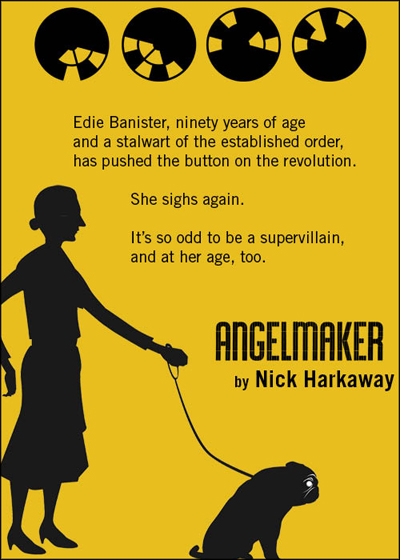
Edie Banister, a central character in Angelmaker, is an especially fresh and un-stock spy hero. Where did she come from? When she first formed in your mind, was she very old, or very young?
Ah, Old Edie came first. She came before any of them actually, and I saw that she was ideal for the part and brought her in. Her original shape was actually very much what she is now: a dangerous old woman with a dog and a handgun. I had some notion of her as a former burlesque dancer, so she had a slightly more gangsterish vibe then, but the spy role suited her very well. And then she merged with a kind of Bletchley Park thing. When that starts to happen – when the pieces reach out for one another like that, and one problem solves another – I know I’m in the zone.
At what point in your life did you “know” being a writer was what you wanted to do? Was there anything specific that occurred to put you on that path? Were there any points at which you considered giving up in favor of a “normal” job?
I always knew it was a way to live, that’s the thing. And I had no illusions about it not being hard work. For a while, I wanted to be an environmental lawyer, and I very nearly ditched writing in favour of a belated law degree in around 2006 when I just couldn’t cope with the film biz any longer. I felt I had three options: produce, write a book, or train as a lawyer. I went with the book, but if it hadn’t been a success, one of the other two was next.
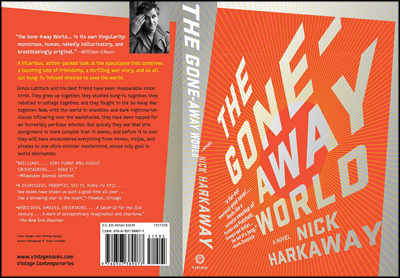
The Gone Away World combines levity and absurdity with heavy subjects like war, displaced cultures, loss/grief, existentialism. Angelmaker, similarly, is full of poignancy in one moment and gloriously silly in the next. Is that a result of a tendency to see the humorous or absurd side of things many of people only see in single dimensions? Where do you think that perspective developed from?
I think that as a storyteller you have to own the cardinal directions of the heart. If you’re trying to scare people, they will try to laugh at you, so you have to take control of the funny side and control their access to it. If you want to make them laugh, you have to be able to make them sad first. And when you start to do that, very quickly you’re putting those things next to one another, which is where they belong: life is a patchwork.
What on earth inspired the Matahuxee Mime Combine from The Gone Away World?
I have no earthly idea. Sometimes stuff like that arrives in the writing, but they were like Edie: drifting around looking for a home. And then suddenly there were these two guys in a truck moving across a landscape of catastrophe, and I knew that they were part of it all. Or perhaps I misremember. The original ten pages or so of TGAW was actually a bit more donnish – the FOX was “pure liquid fiction” and there was a whole skit about drowning in aerosol parody. I stripped all that stuff out as belonging to a writer who was much more at home with self-consciously literary writing than I am, but maybe a dash of Existentialist dresscode spun off into the Mime Combine. TGAW also had a Jaws riff for a while – they were being pursued across the country by a giant shark – K and the gang were part of a larger cultural movement called the Airstream Grove. Now that I think about it… hmm. I realise I could do something there. I’m not going to write a sequel or anything, but there’s some cool stuff I might repurpose some day…
If you could have any superpower, what would it be and why?
Healing factor. I like shapeshifting, too, so long as it comes with healing factor qualities. In the end, the guy who just keeps on getting up is the guy you want to be.
What’s your process like when working? Do you write on a daily basis and try to adhere to a schedule, or do you tend to work in bursts after processing ideas?
Both. I do a solid push for a while, then I have to retrench, put the story on track or adjust the narrative for where the writing process has taken me. It’s a constant feedback loop, or a string of loops.
What’s next for you?
Oh, well, lots of things. I have a non-fiction book on technology and society coming out in May, and I have my third novel in first draft, so I need to work on that. And I have this detective thing I want to do, except maybe it’s not for now, in which case there’s always that slightly Gormenghasty one, or the Dylan Thomas-style riff about space and time, or my story for kids, or a bunch of things I haven’t thought of yet… We’ll see! That’s part of the fun.
Do you have a doomsday preparation plan? What is it?
Sure. It’s the only plan which really matters in that eventuality: survive and rebuild.
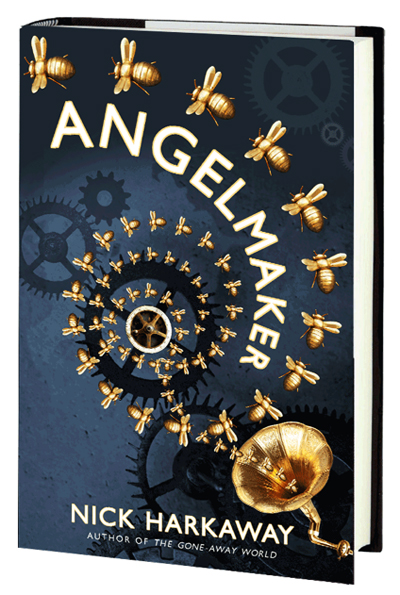

August 29th, 2012 at 1:41 pm
This is a fantastic interview about a fantastic book. Thanks!
August 29th, 2012 at 5:32 pm
Thank you, Zoe!
September 13th, 2012 at 1:09 am
[…] 3. Eventually, perhaps, contributions to a list of questions to ask the author, who is generally a very obliging citizen of the internets. You will have to do your homework, though, and try not to submit any questions that he has already addressed. Read his blog, his non-fiction book (The Blind Giant), and his author interviews (here’s one to start with). […]